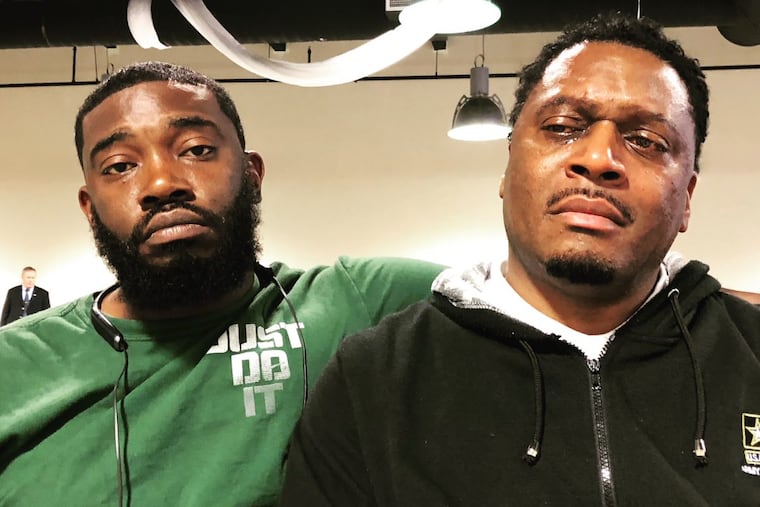Detectives to families of homicide victims: 'We're not giving up' | Helen Ubiñas
In a city where nearly half of homicides go unsolved, a "next of kin" meeting brings detectives and families of Philadelphia homicide victims together.

Lauronda Fletcher had turned over every detail of her son's murder in her mind since the January 2017 night someone fired multiple rounds into 26-year-old Maurice Riley while he worked on his car on a Philadelphia street.
And now here she was, in a bare back room at the offices of Concilio, a community nonprofit on East Hunting Park Avenue, mining every recollection, every conversation, and every street whisper for potential leads that might help the detective sitting across from her.
With each offering, Detective Robert Fetters, a soft-spoken veteran investigator, scribbled in his notepad. Sometimes, he pulled a police report or a witness statement from a folder to help refresh his memory — which is understandable, given that 312 people were murdered in Philadelphia last year. As of Thursday, this year 94 people have been slain — another round of homicides to solve and families desperate for answers.
Yes, he told Fletcher, they'd talked to that witness, and that one, too. He'd tried to call one of them that very day, but the guy's number was no longer working.
That's OK, he reassured Fletcher when he looked up from his notes to see her stricken face.
"We're not giving up."
Fletcher's hands shook. Her voice, at times rising barely above a whisper, cracked as she shared that she was just now rejoining the living. How just recently — more than a year later — she was able to go back to the job at a local college that proved unbearable when every student's face reminded her of her son's.
"I'm sorry," she apologized. "I just … I just haven't been doing well."
At times, Monday night's "next of kin" meeting that the Philadelphia Police Department held for family members of open 2017 homicide cases felt more like a therapy session than an informational meeting, as seasoned homicide detectives tried as best they could to counsel families through their grief and anger — sometimes anger that was directed squarely at them.
Before I'd joined Fletcher and her best friend in the back room, I'd been speaking to the family of Daymond Garner. Garner, 29, was executed last June inside the West Oak Lane home he shared with his grandmother. He was shot at 14 times.
Tears streamed down the face of Garner's father as his mother recounted that night.
Irene Garner was upstairs when she heard what she thought were firecrackers. When she came down, she thought her grandson had collapsed from the sickle cell anemia he'd battled his whole life.
"But he was gone," she said softly, her walker perched nearby.
When I asked the family members what they hoped to hear from the detective working the case, Garner's uncle, Daniel Garner, spoke while comforting his brother.
"Tell us what you're doing." he said. "Tell us something. Tell us someone isn't going to get away with killing him."
Both hope and fear brought about 25 families to the center. That, and wanting to make sure that the people charged with hunting down their loved ones' killers also knew that their growing caseload was filled with people who were loved, no matter the circumstances of their deaths. To help punctuate that, Tahira Fortune came with a large photo of her 18-year-old son, Samir, gunned down in his home in February.
For all the years on the jobs, all the reasons to be hardened by the people behind the murders, that didn't seem lost on the detectives who joined the families in frustration.
"Next to telling a family member that their loved one had been murdered," Detective Fetters told Fletcher, "telling them that the case remained open was the hardest part of the job."
Maybe some cases, with fresher leads, rise to the top, temporarily, he conceded. But that doesn't mean they stop working on cases like her son's.
There was always hope that new evidence would surface, that a witness would grow a conscience — or, more likely, that people would need to make a deal when they found themselves in trouble.
As Fetters wrote down new leads to pursue, I could pick up snippets of conversation from the next room, where another detective was meeting with another family equally desperate for answers.
"Don't understand."
"Makes no sense."
"…Somebody knows."
Even when family members were satisfied that police were doing all they could, they were afraid of what seems like the inevitable in a city where nearly half of homicides go unsolved.
Read more: Ubiñas: Unsolved murders in Philly haunt mothers waiting for justice
"We've been waiting for a year," said Kim Mills, who with her sister Gail Sills had come to meet with a detective about their brother's murder during a robbery last March. "But there are people who have been waiting a lot longer, and what that tells these families is that nobody cares, what that says is that we're a city that doesn't care."
Back inside the room with Fletcher, after about an hour, there didn't seem much more to say to the grieving mother.
"Unfortunately," Detective Fetters said, "I don't have an answer that is going to satisfy your heart today."